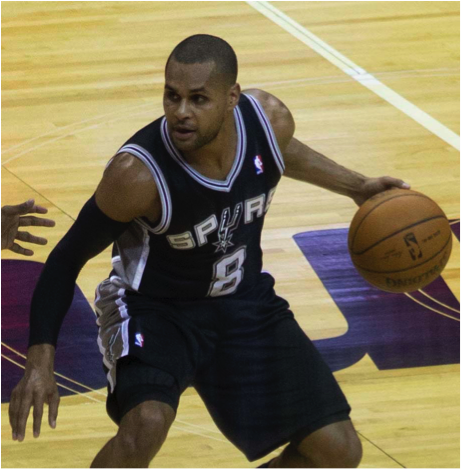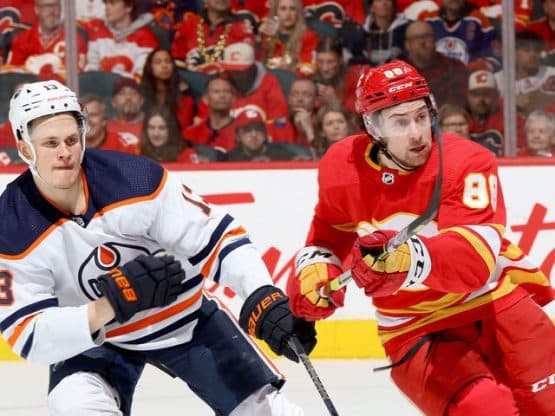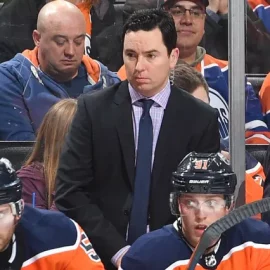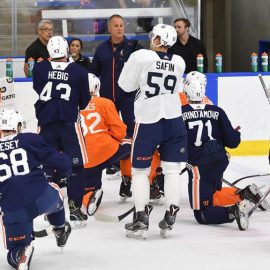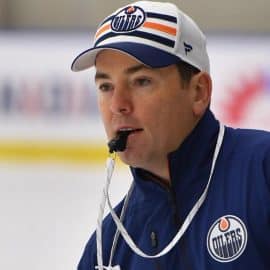Genius: (noun)
- exceptional intellectual or creative power or other natural ability
- a person who is exceptionally intelligent or creative, either generally or in some particular respect
Etymology – (Latin) attendant spirit present from one’s birth, innate ability or inclination
(courtesy Google)
When we discuss a player’s strengths these days we often hear the term “hockey IQ”. This is generally meant to refer to the player’s ability to understand the game, it’s flow and the mechanics involved in various strategies as well as how to manipulate and anticipate certain events to your benefit.
IQ is a troublesome concept, but the idea of genius is a little easier to work with.
But even geniuses come in a variety of fashions. Some exemplify their trade or art (Raphael), others redefine it entirely (Michelangelo).
In the realm of classical music, three giants stand astride the landscape: Bach, Mozart and Beethoven.
Their genius is undeniable, yet each one demonstrated their gift in particular ways that have combined to define the musical landscape ever since.
So within the context of hockey IQ I can think of three geniuses with whom we might compare Bach, Mozart and Beethoven.
Don’t go! Seriously, hear me out here and I promise I’ll try to make it worth your while.
J.S. Bach (1685 – 1750) was the first in the trinity of classical music. His work set a standard that stands even today. Listen to some of his music and you may be surprised at how easily it translates to the modern musical ear. As you listen, even if you don’t like it, you might notice that every note is exactly where it should be. The music is so fundamental that it seems to be almost intrinsic, the way Newton’s laws of physics appear so patently obvious and yet they had to be discovered and written down in order to be truly understood.
Today we could see the same thing take place musically in the way the notes in Tom Waits’ Downtown Train or the opening of Guns and Roses’ Sweet Child of Mine follow one another so that you can’t imagine there being any other alternative – not that those artists are on the same level as Bach, only that they have tapped into that same influence.
Bach worked at a time when musical composition was strictly set out by a number of rules and formats, and yet despite this very few had had the skill and creativity to truly exploit these forms to their fullest extent. Bach not only exemplified everything music was thought to be (and indeed could ever be) but his work stood as such a fundamental pillar of the art that even those more famous composers who came after him built their work upon his model.
Bach’s songs themselves became timeless, and contain elements of music that transcend their era and are as applicable today as when they were first played nearly 300 years ago.
That was Bach’s genius.
In that fashion, that was also Gordie Howe’s (1928 – 2016) genius. He played the game in the traditional way, but to such a level that no one could match him. He defined everything everybody thought they already knew about hockey but had rarely, if ever, seen put together all in one package.
He was a prolific scorer, but also an exceptional passer. He skated as well as anyone but was so incredibly strong that no one could match him. And he was as kind and giving off the ice as he was brutal and mean on it. As a player, he was the complete package, even by today’s standards.
Gordie Howe would be as popular a player amongst coaches and GMs today as he was in his prime over 60 years ago, his strengths were many and all lent themselves to every aspect of the game of hockey, both the beautiful and the grim.
Bach set the standard for music, all music, that exists to this day in a way that Gordie Howe still dominates the standards of hockey that we recognize even today. He exemplified everything that we imagine a hockey player to be, both in his own time and today.
Wolfgang Amadeus Mozart (1756 – 1791) came along shortly after Bach and famously mocked the grand old master’s work, turning every known rule about how music was to be played on its ear, pardon the pun. He was a rock star of his age and much like Bach, his genius lay in not only overturning the rules of the trade but, like his predecessor, in seeing musical arrangements that seem so natural, so compelling that we can’t imagine how nobody wrote them before.
Listen to the opening of Eine Kleine Nachtmusik (literally, “a little night music”) and even if you hate classical music, you’ll recognize it. Mozart’s genius lay in seeing the obvious, what often seemed simple in hindsight, and bringing it to an unheard of emotional level. With a few simple bars he could evoke terrific effect on the soul.
Mozart’s popularity lay not so much in creating music that everyone liked, but in creating music that people hadn’t even realized they wanted. Yet when they heard his work they were awe struck. It wasn’t that Mozart threw the rules of composition and music out the window, but rather he looked at the spaces between the rules where nothing had yet been written and therein filled it with his own masterful creations.
He changed the way music was composed, played and listened to and people wondered why it hadn’t been done before.
Bobby Orr (1948 – present) was a genius. He changed the way the game was played. Before Bobby, a defender stayed back, picked up the puck, passed it out of the zone or punished those opponents who brought it in.
Bobby skated the puck out and did it with greater skill and elegance than any other defencemen. Heck, better than anybody else on the ice. He saw a way the game could be played, simply, elegantly, beautifully, and he damned well went ahead and did it.
He was precocious. Young and fiery-tempered, Bobby Orr wore his heart on his sleeve as he brought fans, regardless of their loyalties, out of their seats.
Watching highlights of Orr today may seem kind of quaint, but understand that people simply weren’t trained to look at the game that way. It wasn’t that a defender wasn’t allowed to do what Orr did, it was just that very few (maybe no one) could skate as well as Orr and fewer still had the hands to score as well as Orr did.
I said it before, but I think it needs to be driven home – Bobby Orr changed the way the game of hockey was played.
In this way, Orr and Mozart have some things in common. Both were vibrant, emotional creatures, filled with a passion and drive for the art form they loved. Both saw simplicity where others were confounded by what they saw or lacked the god-given gifts to act. And both had their careers cut short, mercifully, it was only Orr’s hockey career that ended and he is with us still.
Finally, we arrive at Ludwig van Beethoven (1770 – 1827). Beethoven arrived on the music scene during a period of great political instability in Europe following centuries of nearly constant warfare. His music is far more tempestuous and engages the listener in a very direct emotional fashion more akin to what we would expect today than might his contemporaries.
Like Bach and Mozart, Beethoven changed music. He changed the way composers viewed their work, how musicians had to play, and he did it to such an extent that even artists today, whether they realize it or not, work in the echo of Beethoven’s impact on their craft.
To give an idea of the depth and intensity of Beethoven’s understanding of music understand that he wrote many of his later works – the ones of which you could hear only a few notes and recognize them whether you ever listened to classical music or not – when he was almost completely deaf. He did so by feeling the vibrations of the piano or by hearing the music in his mind, all through a deep-seated feeling for what came next and his own grasp of the art that was far beyond anything anyone could imagine.
Beethoven’s Fifth symphony is a standard of the musical world, but listen to his Fur Elise, Moonlight Sonata or his Ninth Symphony and you will see vastly different approaches taken by the great composer to impress upon the listener an emotional state. Beethoven died nearly 200 years ago, yet his music is as moving and astounding to us today as it was in his own time.
You can probably guess where I’m going with this.
https://www.youtube.com/watch?v=RCrUcovi820
Wayne Gretzky (1961 – present) played the game on a level that even today we struggle to understand. Gretzky understood the game and the way it needed to be played – not just by him but by the 9 other skaters on the ice, often better than those players themselves and often better than his coaches.
You did not coach Gretzky. If a coach told him to go to this or that spot on the ice to wait for a pass, and Gretzky went to the other side of the ice to wait for the pass, you can almost bet that the puck was going to come to where Gretzky was waiting.
He just knew.
In the same way that we are still working on understanding what Beethoven did to music (and not just classical music but our modern understanding of what music is) over 200 years on, we are still wrapping our heads around what Wayne Gretzky did in the NHL over twenty years between 1979 and 1999.
Beethoven shook off the constraints of musical tradition and shattered what most people believed music had to be like and what it was meant to do. His work reshaped the entire landscape.
It has been said that Beethoven changed the context of harmony and how people understood music. Specifically, he destroyed the old paradigms of structure and musical architecture so that you no longer had direct, discrete phases and narratives that you worked through, but that the music would, like life itself, craft several different musical themes that would work and wend themselves towards a conclusion.
Pink Floyd’s album The Wall, a work of creative genius in its own right, is a modern descendant of Beethoven’s iconoclastic legacy, working its way through various narratives and contrasting themes towards a conclusion.
Gretzky changed the context of hockey. Before him there existed a pantheon of great players, of course Gordie Howe was considered the greatest by many though Bobby Orr was the challenger for a younger generation, but the records were dispersed across decades and filled with many different names. Then along came this skinny young man from Brantford and before long he wrested control of record after record, not only claiming them as his own but obliterating those that came before him.
He didn’t change the game the way Orr did, nor was he some sort of physical specimen in the traditional model; he played the game so intuitively that his genius was in seeing what was always there but had never been noticed.
Gretzky would make a pass that, seconds earlier, nobody would have thought of making. But once he did it and in the seconds immediately afterwards, everybody could see exactly why and almost invariably it was the right play at the right time to the right place.
In much the same way that when one listens to Beethoven it seems as though we must have always had his music because the notes and their order are so apparent, the melody so essential, that it is difficult to understand why no one came up with it before.
Michelangelo once said that he did not sculpt anything with intent, he merely removed the pieces of marble that prevented us from seeing what always there.
Hockey is a chaotic game. Fast, violent, and in some ways unpredictable. Gretzky was not fast, he was not physically intimidating, his shot was not especially dangerous. He succeeded because he saw through the maelstrom of bodies to what the game could be and he had the skill required to make it happen.
He was perhaps the greatest genius the game will ever see.
Howe, Orr and Gretzky all contributed fantastic things to the sport of hockey. Each one brought a kind of genius to the game that not only brought entire generations to their feet but that left legacies, not just of championships won, but of how they played the game, how they changed the way we play the game today.
The modern NHL, like every generation, must find its own way through the balance of carrying with it the weight of all those who have gone before, as well as leaving room to draw breath for the great deeds yet to be done. Of those jaw-dropping acts of athleticism that we celebrate today, many are built upon the foundations laid by these three men and many others who have gone before.
Add The Sports Daily to your Google News Feed!
